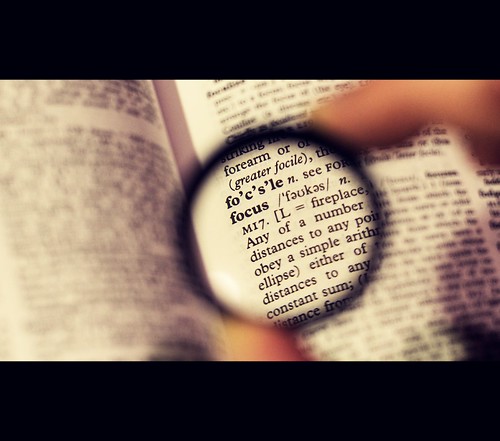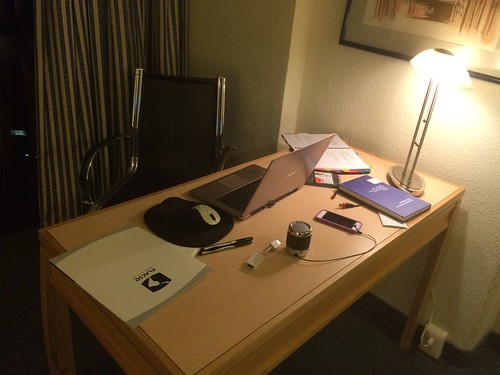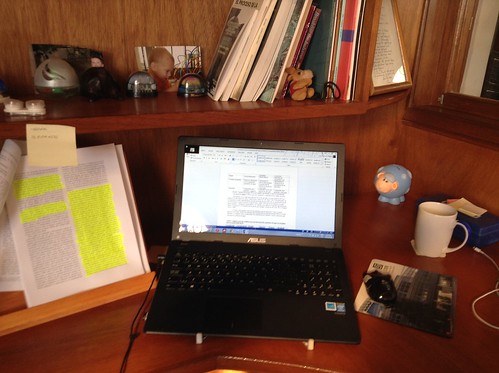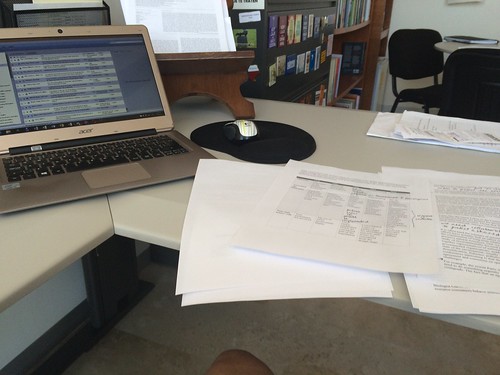If there’s a downside to being a polymath is that everything looks interesting. If I don’t control myself (and I have to be quite strict about this), I can easily spend hours down the rabbit hole of Twitter and Facebook, or the depths of the internet. Distractions come easy to me, sad as this may sound. However, there are a few things I do purposefully to be able to focus. I am going to share these in this post. But first, a bit of background.
I was showing my Mom last night the gift I got from one of my administrative assistants (a collection of Herbert Von Karajan directing Mozart, Chopin, Brahms and a few other composers’ works). Normally, I use classical music to write, and other types of music to do different tasks. This conversation with Mom made me realize I need to engage in actual “hacks” or “tricks” to force myself to focus. Focusing isn’t something that comes naturally to me, I’ve developed it through hard work (so much so that last year, my Word of the Year was FOCUS)
Here are some hacks I use. Some of them may be quite obvious, and simple, but they do work for me.
1. I physically close my laptop for at least 30 minutes every morning.
As anybody who reads my blog or follows me on Twitter knows, I wake up every single morning at 4 am to start working (usually, writing). Most of the time, I write in an uninterrupted 2 hour block. I have been doing this for quite a few years now, and this strategy works well for me. Obviously, I am as tempted as anyone else to check my email or Twitter as soon as I wake up. I fight this urge with all my might. So I use a simple trick: I close my laptop and leave my working materials on a clean working surface every morning. Doing this allows me to free-write by hand, or read a journal article, a book or a book chapter, and highlight and scribble notes on paper (be it on the margins of the paper or in my Everything Notebook).
To force me to focus I purposefully close my laptop and leave it closed for at least 30 mins every morning. pic.twitter.com/oF5KuRMleX
— Dr Raul Pacheco-Vega (@raulpacheco) January 8, 2017
Closing my laptop and clearing my desk forces me to do something that is NOT reading Twitter, Facebook or sending emails. 30 minutes of focus on non-computer-related tasks does wonders for my concentration. This effort often pays off by actually helping me concentrate further.
2. Once I start a piece of work, I force myself to concentrate for AT LEAST 30 minutes
I know that if I allow myself to be interrupted during a task, I will always be interrupted. So I set up a timer and I set it at 30 minutes. Contrary to the Pomodoro method, which establishes that you should work for 25 minutes and force yourself to take a break of 5 minutes, I let my brain continue working if I’m still concentrated. From my own experience, my brain starts to wander after 90 minutes, so if I can concentrate for 30 minutes, chances are I’ll be able to go for 45, 60, 75 or 90 minutes non-stop. The lower limit for me is always 30 minutes, though.
I’ve always advocated that even 15 minutes helps, so you can do the same as well (e.g. concentrate for at least 15 minutes). This focused, concentrated time is what Cal Newport calls “deep work”, and Srinivas Rao calls “uninterrupted creation time“.
Touch One Time rule, RPV edition: read summary, find main ideas – rhetorical précis or memo, labelling, filing pic.twitter.com/yKn55HhS52
— Dr Raul Pacheco-Vega (@raulpacheco) January 8, 2017
I find that it is particularly easy for me to concentrate if I follow the PDF-to-Memo-or-Rhetorical-Precis Protocol. Touch One Time rule, academic’s edition.
3. I only write listening to classical music
I love 80s, 90s and 2000s music, as well as jazz, acid jazz, soft rock and chill-out music. I can work listening to all of these. HOWEVER, if I am writing, I ONLY listen to classical music. That way I can focus easily because I’m not even listening to rhythm (and there are no vocals). I do NOT use opera, because I associate opera with my Mom and my brother, and my mind wanders to happy occasions when we’ve gone to concerts together. I primarily listen to piano concerts, though I’m open to violin and other orchestral arrangements. But for example, when I am writing a blog post, I usually listen to acid jazz or chill/house music. This kind of music is also instrumental but allows me to focus on another type of writing. I’ve also associated classical music with writing in such a strong way that when I am driving to campus and I start listening to this type of music, my first instinct is to want to stop and open my laptop and start writing! (yes, a bit Pavlovian).
4. I tackle a couple of easy Quick Wins, then a more complex/tedious/involved task.
This is something I learned when I was playing competitive volleyball. My trainer would always start us off with drills that would be enjoyable for us, and where we would perform well (for me, this was hitting from the 4th position, and receiving when balls were served against me – I have always been very competent at both tasks). Then he would ask us to focus on a less-exciting task, but one we needed to get competent at. I would usually choose blocking, because that was what I wasn’t really good at at the time. Believe it or not (and I know it’s just anecdata and N=1) but it worked, and my performance with regards to how many blocks I could perform would increase.
I do the same now. Usually, a Quick Win for me is writing a couple of rhetorical precis on a couple of articles, or 500 words of a memorandum of a paper I’ve already highlighted, plus highlighting another article. I love reading and I love highlighting and summarizing articles, those are some of the strong, easy things-to-do that I can assign as Quick Wins, before engaging in a more involved process.
Another Quick Win I use is dumping quotations from one article into my Excel conceptual synthesis worksheet. So, I schedule a couple of Quick Wins, THEN one annoying or more engaging task. That usually engages me for the rest of the 2 hours block (and even if it’s just re-arranging or line-editing or free-writing, that one task feels a lot more rewarding).
5. I set specific deadlines throughout the week (by day) and throughout the day (by the hour), and reward myself when I comply with them.
For example, if I know that a student of mine needs a letter of reference, and I know for a fact that the deadline is a specific day, I set myself up to finish writing the letter BY 4PM OF 24 HOURS BEFORE THE LETTER’S DEADLINE. Or for example, if I’m feeling unfocused but I know that I have a meeting with a colleague, I read everything they expect me to read and/or finish whichever task we agreed upon by at least 3 HOURS BEFORE the meeting. That way, I feel like I accomplished stuff, and I don’t let myself feel overwhelmed. I think to myself “well, if I finish reading this piece by 11am, I can go for a quick walk around campus, and be ready for my 2pm meeting“.
6. I set the menial tasks for when I’m low on energy or focus.
For example, I know it’s hard for me to concentrate right after lunch (and I try hard to eat a small amount of food every 2-3 hours). Thus, I normally set my To-Do list to finish menial tasks (what I call, The Grunt Work). Cleaning references in Mendeley. Sending emails to set up meetings. Clearing my desk and sorting and filing (using the Four Tray Method I wrote about a few weeks back).
As I’ve said, concentrating and focusing is hard for me too, so hopefully the strategies I use will be also useful for you if you, like me, have a hard time with concentration and focus!





Try Reddit. Talk about rabbit holes… smh.
Im a student! and I loved reading this (at 2 am …) and it got me motivated! Do you use your phone to wake up? I wake up every morning and spend the 30 min on my phone. this will be a tough habit to break, especially since i use my phone as my alarm.
I wake up on my own!
Thank you so much for sharing this routine and tips! I wish I had read these earlier, I will definitely come back to read more. Thanks a lot again!
This is amazing! I too get interested in a lot of things and so find it difficult to concentrate and focus often. Thanks for these gems. Will try to put them in practice. 🙂
Also, is there a way I can set up email subscription to your blog. I am not always active on twitter and I tried to opt for RSS feed but it kept showing some error.
Thanks for the motivation. Please keep writing.